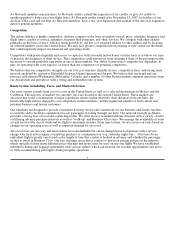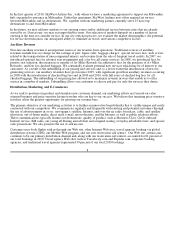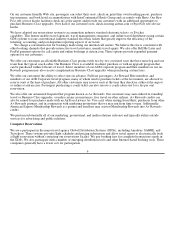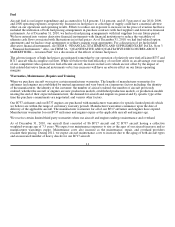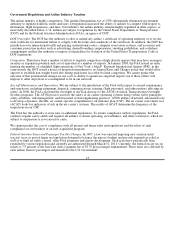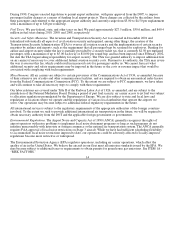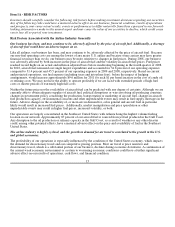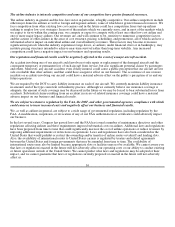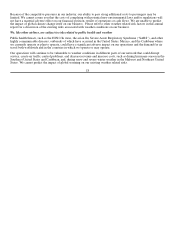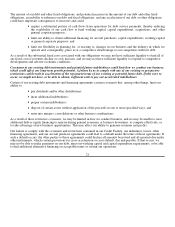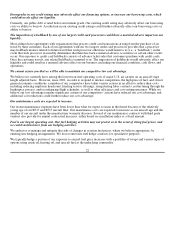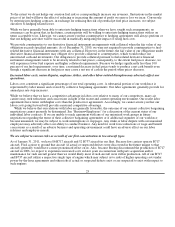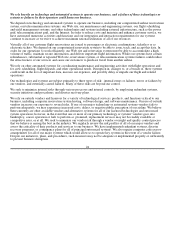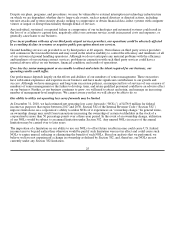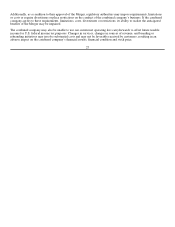Airtran 2010 Annual Report Download - page 25
Download and view the complete annual report
Please find page 25 of the 2010 Airtran annual report below. You can navigate through the pages in the report by either clicking on the pages listed below, or by using the keyword search tool below to find specific information within the annual report.
Increases in insurance costs or reductions in insurance coverage may adversely impact our operations and financial
results.
Past terrorist attacks and the possibility of future terrorist attacks have adversely affected the ability of airlines to obtain
private war risk insurance as well as the cost of such private insurance, when it is available. Since November 2002, the
federal government has provided third party, passenger, and hull war-risk insurance coverage to commercial carriers
pursuant to legislation under a variety of federal laws. Currently, program authority is effective until December 31, 2013.
We have received certification of coverage through September 30, 2011. If the federal insurance program terminates, we
would likely face a material increase in the cost of war-risk insurance or such insurance might not be available at all.
Because of the competitive pressures in our industry, our ability to pass along additional insurance costs to passengers
may be limited. As a result, further increases in insurance costs or reductions in available insurance coverage could harm
earnings. Any coverage that might be available to us through commercial aviation insurers also could have substantially
less desirable terms and might not be adequate to protect our risk, which could harm our business.
Future acts of terrorism or escalation of U.S. military involvement overseas could adversely affect the airline industry.
Even if not directed at the airline industry, a future act of terrorism, the threat of such acts or escalation of United States
military involvement overseas could have an adverse effect on the airline industry. In the event of a terrorist attack, the
airline industry would likely experience significantly reduced demand. We cannot assure you that such actions, or
consequences resulting from such actions, will not materially harm our business or the airline industry generally.
Like all U.S. airlines with operations outside of the United States, we face certain risks associated with our
international operations, including failure to adequately comply with existing U.S. legal requirements regulating
foreign business practices.
We have expanded our service to Mexico and various countries in the Caribbean. Operations outside the United States
may subject us to increased legal compliance risks. Likewise, non-U.S. operations may subject us to political and
economic risks based on developments in an individual country. We emphasize legal compliance and have implemented
policies, procedures and certain ongoing training of employees with regard to business ethics and many key legal
requirements; however, there can be no assurance that our employees will adhere to our code of business ethics, other
company policies, or other legal requirements. If we fail to enforce our policies and procedures properly or maintain
adequate records and internal accounting practices to accurately record our non-U.S. transactions, we may be subject to
sanctions. In the event that we believe or have reason to believe that employees have or may have violated applicable laws
or regulations, we may be subject to investigation costs, potential penalties, and other related costs which in turn could
negatively affect our results of operations and cash flow. We periodically evaluate the political, economic, and business
climate in each country in which we operate for developments which could adversely affect our business.
Global climate change and initiatives to address global climate change may adversely affect our business and increase
our costs.
Many existing aspects of airline operations are subject to stringent environmental regulations. Legislative and/or
regulatory action to address concerns about climate change in general and the emission of greenhouse gases (GHG), in
particular, could result in substantial additional costs for us. In October 2009, the U.S. Environmental Protection Agency
proposed regulations that would impose controls on GHG emissions. The proposed regulations would not directly control
GHG regulations by airlines. However, a number of states and environmental organizations have asked the U.S.
Environmental Protection Agency to regulate greenhouse gas emissions from aircraft.
17


